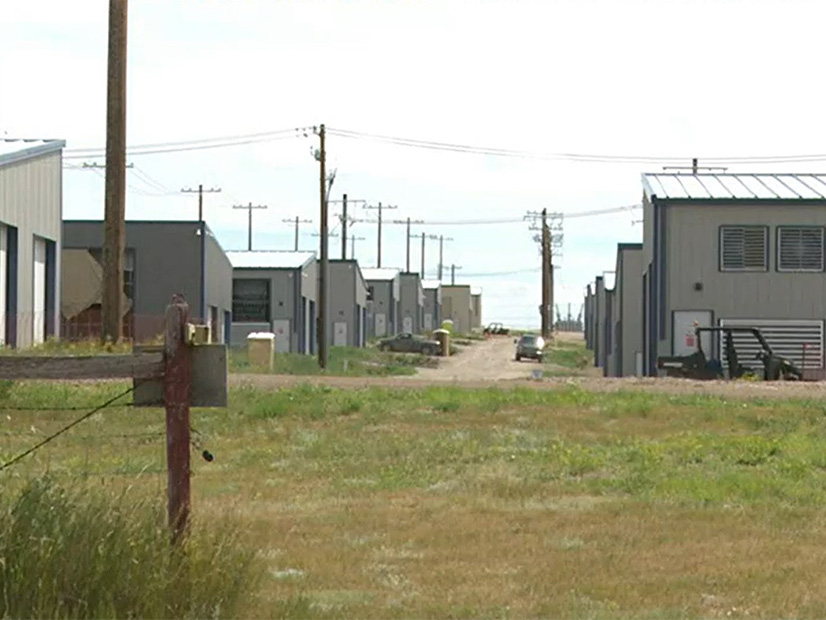FERC has dismissed separate complaints from MISO and Montana-Dakota Utilities Co. over a MISO-SPP flowgate chronically stressed by a North Dakota cryptocurrency mining operation.
The commission issued a Sept. 10 order, refusing the pair of complaints; it said neither MISO nor Montana-Dakota Utilities (MDU) proved that the Charlie Creek flowgate in North Dakota failed to meet the criteria for market-to-market (M2M) coordination, nor was SPP in the wrong for continuing to insist on M2M coordination (EL24-61).
MISO and MDU have been sparring with SPP over the flowgate since last year, when cryptomining facility Atlas Power Data Center opened and brought 200-MW load to SPP’s transmission-constrained Northwest North Dakota load pocket, which now has a peak load of about 1.5 GW but only approximately 1 GW of import capability. (See MISO Lodges 2nd Complaint Against SPP over Disputed Crypto Load on M2M Flowgate.)
FERC said it disagreed with MISO and MDU that SPP violated sections of the MISO-SPP joint operating agreement, that MDU incurred duplicate congestion charges and that the rules MISO and SPP rely on for M2M termination are unreasonable.
The commission found that “MDU and MISO have not demonstrated that SPP acted unreasonably in declining to grant consent to remove the Charlie Creek Flowgate from the market-to-market coordination process.”
SPP has maintained that Charlie Creek remains eligible for M2M coordination based on the RTOs’ flowgate studies, which it argued determine hundreds of other MISO-SPP flowgate designations.
MISO and MDU have argued that although the Charlie Creek Flowgate passes MISO and SPP’s flowgate studies, its M2M status should be revoked because the RTOs’ coordination is helping SPP manage a local issue caused by data center load growth, and not a regional issue. The two said the congesting spikes caused by the Atlas Power Data Center are squarely in SPP’s territory and said SPP’s insistence on M2M coordination is at the detriment of MISO market participants and customers.
MISO last year initiated a formal dispute process with SPP over the flowgate. By March, it asked FERC to terminate M2M coordination on Charlie Creek and requested refunds on the M2M coordination charges it paid to SPP beginning in April 2023.
MDU filed a complaint against MISO and SPP early this year, saying it was overcharged $18 million for congestion management because the two RTOs were conducting unwarranted M2M coordination. MDU, a MISO member, has 150 MW of load and two 115-kV lines in the load pocket and relies on network integration transmission service from SPP to serve load when its own transmission is insufficient.
MISO claimed that improper M2M coordination cost its members $38 million in M2M charges to manage congestion. The grid operator also argued that SPP’s approval of a temporary remedial action scheme for the Charlie Creek flowgate shows that the M2M coordination is being used to address a local issue wrought by load growth.
MISO’s Independent Market Monitor further argued that, during periods of market-to-market coordination, MISO could provide less than 1 MW of relief on the Charlie Creek flowgate, while curtailment of Atlas’ load in SPP could provide more than 90 MW of relief.
However, FERC said MISO and MDU were misreading the definition of an M2M flowgate as laid out in the MISO-SPP joint operating agreement. FERC said while a section of the RTOs’ Interregional Coordination Process says M2M coordination should be reserved for issues that are regional and not local in nature, that’s not an explicit prerequisite for a flowgate to be eligible for an M2M flowgate designation.
Because it determined the regional issue threshold wasn’t a requirement for M2M coordination, the commission declined to determine whether the added cryptomining load constitutes a local issue.
FERC pointed out that SPP provided evidence that revoking Charlie Creek’s M2M flowgate status might risk SPP needing to resort to transmission loading relief or load shedding.
FERC also refused to deem MISO and SPP’s Interregional Coordination Process unreasonable because it allows either MISO or SPP to refuse to lift M2M designation even when the other RTO can offer little congestion relief. MISO argued that the mutual agreement condition amounted to an “unconditional veto.”
But the commission said the rules give MISO and SPP “reasonable discretion on an equal basis to mutually agree to add or remove market-to-market flowgates without any conditions or requirements.”
FERC decided SPP acted reasonably by not agreeing to remove M2M coordination. It said SPP provided evidence that it can redispatch to alleviate the flowgate in “most” hours. FERC also said keeping up the M2M coordination “helps create an appropriate market signal for MISO to dispatch generating units within its footprint that have a significant generator shift factor on the flowgate,” making for a more efficient market solution versus terminating M2M procedures.
Because it denied the complaints, FERC likewise denied a related waiver request from MISO that would have allowed the RTO to adjust SPP’s Integrated Marketplace settlements beyond the current 365-day limit (ER24-1586).
Nearby Basin Electric Power Cooperative announced plans in May to build a 1.4-GW gas-fired power plant to address growing demand from North Dakota’s data center industry.




